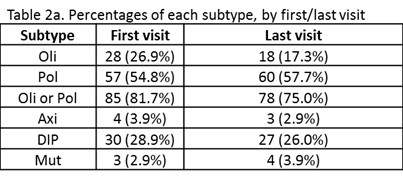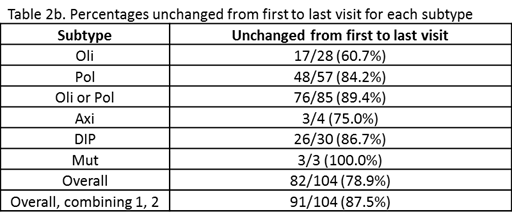Session Information
Session Type: ACR Poster Session C
Session Time: 9:00AM-11:00AM
Background/Purpose: In 1973 Moll and Wright published the first paper on the classification criteria for Psoriatic Arthritis (PsA). In their pioneering work, these authors additionally described 5 subtypes of PsA: Oligoarticular (Oli), Polyarticular (Pol), Axial (Axi), DIP form (DIP) and Mutilans (Mut). The classification criteria have been replaced by the CASPAR criteria, and as a consequence there has been a loss of emphasis on the importance of the subtypes. Arguments for decreased significance have been based on claims that these subclasses may overlap, are not stable, and can change over time.
The hypothesis of this study is that with some exceptions, the Moll and Wright subtype classification criteria are stable over time and may have important therapeutic implications.
Methods: This was a retrospective cohort study. All patients with ICD-9 or ICD-10 PsA codes seen at a single center from January 1, 2013 through December 31, 2016 were identified. Patients who met CASPAR classification criteria and who had a Moll and Wright subtype identified and at least a 2 year follow up were studied and described. The distribution of continuous variables was assessed using the Shapiro-Wilk test. Categorical variables are summarized as frequency (percent).
Results: 104 patients were identified. Pertinent demographics are presented in table 1. Distribution and persistence of PsA subtype are presented in tables 2a and 2b. As there is evidence that the Oli and Pol subtypes may overlap and be influenced by therapy, a subanalysis combined these forms and the persistence was 87.5%.
Conclusion: In this retrospective analysis, a striking persistence of the subtype of PsA was noted over time. This was particularly noted with the non-Oli forms of this disease. With the advent of therapeutically targeted therapy that may differentially affect the unique subtypes of PsA, this concept needs to be resurrected and perhaps modified. We would argue that Moll and Wright were right.
To cite this abstract in AMA style:
Schwartzman S, Epsten M, Szymonifka J, Paget SA, Mandl LA. Were Moll and Wright Right? [abstract]. Arthritis Rheumatol. 2017; 69 (suppl 10). https://acrabstracts.org/abstract/were-moll-and-wright-right/. Accessed .« Back to 2017 ACR/ARHP Annual Meeting
ACR Meeting Abstracts - https://acrabstracts.org/abstract/were-moll-and-wright-right/



